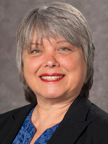Leadership: An innate trait, a core component
When you think of a leader what comes to mind? Is it the loudest person at a podium who commands the attention of everyone in the room? Or the quiet person in the background coaching someone to great achievements?
At the Betty Irene Moore School of Nursing at UC Davis, faculty know leaders take on many personalities and traits. And that leadership is inherent in every individual.
“The idea that you are born into leadership is a misconception,” said Susan Adams, an associate professor and former elected county supervisor in Marin County, California. “The challenge is how do we teach people the skills to tap into their leadership potential.”
Former elected official provides unique perspective to students Associate Professor Susan Adams, a nurse and former elected county supervisor, teaches several courses at the School of Nursing exploring leadership in several areas. For the proposed DNP-FNP program, she teaches Leadership in Health Care and also the course Health Policy. For the Master’s Entry Program in Nursing, she leads Developing Future Nurse Leaders.
Associate Professor Susan Adams, a nurse and former elected county supervisor, teaches several courses at the School of Nursing exploring leadership in several areas. For the proposed DNP-FNP program, she teaches Leadership in Health Care and also the course Health Policy. For the Master’s Entry Program in Nursing, she leads Developing Future Nurse Leaders.
Read more about Susan’s background
Adams says people’s approaches to leadership are as diverse as the individuals themselves. The common denominator lies in the first step of any leader — communication.
“Communication is not you telling people your thoughts or ideas. The most powerful part of communication is being a good, active listener,” Adams explained. “You must listen to understand the perspective the be able to verbally reflect that back. Once a person is heard, you’ve established a foundation to move forward.”
In health care — whether part of a clinical team or a research team — getting to ‘yes’ is critical in enacting change. At the School of Nursing, leadership skills are woven into various courses and across the entire curriculum. In fact, leadership is one of the core values upon which the school was founded more than a decade ago.
Students in their first year of the Doctor of Nursing Practice — Family Nurse Practitioner (DNP-FNP) program learn about quality improvement and safety, organizational and system change and leadership in foundational coursework. In the second year, they apply those skills in clinical experiences.
“When we look at leadership, we’re really looking at how do we transform health care,” said Kathryn Sexson, director of the Doctor of Nursing Practice — Family Nurse Practitioner program. “We’re not just giving you the theoretical frame, but we’re giving you the skills to operationalize it in practice.”
School of Nursing students demonstrate a history of leading in areas of need. Whether its wildfires or COVID-19 vaccination efforts, they actively engage in making their communities a better place. Their educational experiences — both in the classroom and out, in person or virtually, in small groups or individual study — forever change how they view themselves as leaders and how they lead in the world.
“Bold leadership has a lot to do with our geography,” Adams said. “Since we’re located in California’s capital, I’ve had the opportunity to bring students with me to hear debate, meet lawmakers and advocate for policy.”
Adams adds that many times students don’t realize the importance of leadership or understanding how health policy has an impact on practice until they’re out in the world practicing for themselves. But the School of Nursing planted the seeds of leadership to tackle those important issues and thrive in the world.
“Leadership is for everyone and everyone can be a leader,” Adams said. “At the Betty Irene Moore School of Nursing, we’re giving you the opportunity to learn the skills that will get you there.”





